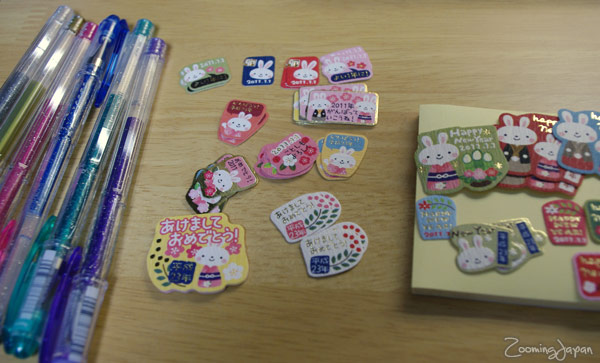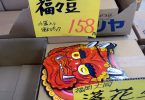Sending cards to family and friends towards the end of the year is something very common. In Japan as well, there’s the custom of sending Japanese New Year Cards, better known as “nengajo” (年賀状).
Now, if you think that Japanese New Year Cards are similar to Christmas Cards, you’re WRONG!
There are a few features that are unique to Japanese New Year Cards that you should definitely know about.
.gif) Feature 1: Duty
Feature 1: Duty
The “nengajo” business is HUGE!!! Not only do you send it to your family and friends, classmates and coworkers, but you also send it to business partners – or basically anybody you know. Companies send it to all their customers. Private schools to their students and vice versa.
Your kid goes to a “juku” (cram school)? Send ’em a Japanese New Year Card!
Your boss? Oh, yes!
The coworkers that you don’t like at all? Hell, yeah!
Japan has various customs like that where you’re supposed to give something to somebody just because it’s your “social duty” (義理 – giri). Another good example of that is Valentine’s Day.

While you’re supposed to send out Japanese New Year Cards to almost everybody you know, not everybody obeys that custom.
There are some people who just send a few cards each year.
More importantly, if you receive a new year card from somebody – and haven’t yet sent one to them – then you better hurry up and return the favor ASAP!
I remember a funny conversation between two of my high school students:
Female Student: “Senpai, do you do New Year Cards?”
Male Student: “Well, if I receive one, I quickly print out one and return the favor.”
Female Student: “Uh, well then nevermind.”
The male student clearly isn’t a fan of this custom and probably thinks it’s annoying, so he’ll only send one if it’s his “duty” (because he has to return the favor). The female student doesn’t want a “giri card” (a card just sent out because it had to be done).
Welcome to Japan’s complicated social customs!
.gif) Feature 2: Design
Feature 2: Design
The most common design is the zodiac of the upcoming year.
So, for 2018 it’s a dog, 2017 it was a rooster. The photos in this article are from 2011 when it was the rabbit’s year.
It’s also common to have photos of your kids, yourself, your wedding etc. on Japanese New Year Cards.
Some people actually make their own design using stamps, stickers and drawing something cool on it!
Big institutions have no time to write all those cards themselves. They print their cards!
There are tons of pictures online for “Japanese New Year Cards” ready to be printed. Have a look at this website (Japanese) to see a few examples.

You can usually buy the postcards starting from late November in stationery shops (e.g. Loft, Tokyu Hands) and post offices.
There’s a huge variety of adorable cards, so I always have problems choosing only a few.
In addition to what is printed on the cards, I always write something personal on them as well – which leads us to the next feature:
.gif) Feature 3: Set phrases
Feature 3: Set phrases
There are several set phrases for Japanese New Year Cards.
It depends a lot on the recipient of the card. You’ll have to use different phrases and politeness forms for friends, coworkers, bosses etc.
Here’s a very short example with English translations.
Here’s a website in Japanese that I often use for reference when writing my new year cards.
Of course, you don’t have to use those set phrases, especially not with friends, but most people do, out of lack of time. It’s easier to print 500 postcards with the same set phrase, right? ![]()
.gif) Feature 4: Lottery
Feature 4: Lottery
Japanese New Year Cards have not only the purpose to wish a “Happy New Year”, but also enable the people who receive cards to take part in a lottery using the numbers that are printed on the back of each and every card! ![]()
Usually they publish the winning numbers in mid-late January.
Here are some of the prizes you can win and also the winning numbers.
I haven’t won anything in the past few years. ![]() Have you ever?
Have you ever?
.gif) Feature 5: Restrictions
Feature 5: Restrictions
If somebody in their family died, Japanese are not supposed to send new year cards.
Instead they send out normal postcards early on, called “mourning postcards” (喪中葉書 – mochū hagaki), in order to let everybody know they won’t accept or send new year cards expressing their respect for the deceased.
There were a few occasions when I had received those mourning cards. However, they came too late as I had already sent out my nengajo to that person.
So many things you have to be careful about!

In case you want to send a Japanese New Year Card:
You can imagine that the post offices get super busy during the end of December.
They guarantee a delivery on January 1st – as long as the cards are sent out before December 25th (within Japan).
The Japanese New Year Cards which can be bought in stationery shops and post offices are so-called “prepaid postcards“. That means, as long as they’re sent within the country they don’t need a stamp!
If you want to send them internationally, it’s possible. Here’s an example of how to correctly fill out a “nengajo” that is for abroad (or for Japan from abroad). As you can’t use the lottery numbers if you’re outside of Japan, some websites suggest you cross them out. However, it’s not a necessary step.
I’m curious. Do you have any customs like that in your country?
Have you ever sent or received a Japanese New Year card?
What do you think about this custom?
Please let me know in the comments below. ![]()
Updated Dec 2017. This article was originally published on January 22, 2012.









Very interesting!
My friend actually send me a card with such a number and I just checked, but… no luck for me ^^;;;
Actually I know nobody who ever won something. :sweatdrop2:
Really interesting are only the 1st and 2nd prizes anyways.
we have a full blown Chinese Lunar new year tradition here in the Philippines :D
Im not really chinese (more like 1/4chinese) but it is part of the tradition to receive money placed in red envelopes from your elders (yay!), we also get to bang the gong to drive away evil spirits and negativity. what i hate about the celebration is the scent of the incense and fireworks. they tend to cover up the whole area with smoke and its hard to breath :notamused:
Hello and thanks for the comment! :hearts:
Really? That sounds quite similar to what happens in Japan.
On January 1st kids receive money from their parents, called “otoshidama”.
It’s also given in small envelopes, but they’re not red! ^^
And yes, you’ll hear the temple bells shortly after midnight for the same reason in Japan.
No fireworks, though.
Nice post and very informative!
Thanks, I’m glad you liked it.
Love reading your blog! Thanks for stopping by here! :D
I love all the cute designs on the cards!!! My zodiac sign is the dragon, so I wish I was in Japan to get a ton of cute dragon cards! :D
Oh, so it must be a great year for you!! :thumbup:
I love the cards with the golden and the black dragon :) I don’t really like writing cards unless I’m in Japan. Sending out Christmas cards or NY cards was so much fun because there were so many cute ones that I wanted to buy and send out more to share :)
Oh yes, I’m the same!
I was never really a fan of sending cards until I came to Japan.
However, as December is always the busiest time for me anyways, it IS a little bit annoying (just because of the timing). :sweatdrop2:
Great post! The cards are so cute and every year we send out Nengajo to family, friends and co-workers.
Yes, there are so many cute designs, right?
Sometimes I have a hard time to decide which cards to buy! :mukatsuku:
Very interesting, I knew about that tradition, but I didn’t knew about the lottery system.
I can’t imagine writing a bunch of cards, although I need to get used to it if I want to live in Japan in the future :bah:
Oh, you don’t HAVE to!
That’s one of the advantages of being a foreigner!
It’s ok if you don’t do it if you don’t want to! :satisfied:
綺麗なデザインのブログですね。
毎年、たくさん届く年賀状を読むのはとても楽しいことですよ。
コメントありがとうございます。 :hearts:
ブログのデザインがキレイと思ってくれて、うれしいです。
そうですね。私はあまりもらってないけど、毎年楽しみにしています! :music2:
Hello,
This past year I have met a couple of people from Japan and would like to send them a New years card. I haven’t been able to find anyplace to buy a card. Do you know of a web site where I can buy them?
Thank you.
Gloria Kemp
..Michigan
Hi Gloria!
Usually you buy them in the post office or stationary stores.
A lot of people just buy blank postcards, find some nice pictures online and print them out.
Outside of Japan you can’t use the “real” ones (involving the lottery).
However, you could just buy a normal blank postcard and either draw something yourself or find a great picture online to print on it, e.g. here or here.
[…] Imagen de Zooming Japan […]
Hi!
I have a Japanese friend whose mom just passed roughly a month ago. I wanted to send him a nengajo this year but I found out you shouldn’t, as part of respect for their passed loved one.
I was wondering.. if you can’t send nengajo to someone with a deceased family member, how do you greet them Happy New Year? Thanks!
Hi Chishiki.
Usually the person who lost a loved one is not supposed to send a nengajo. After all, you can’t know if somebody else lost a family member or not – at least you won’t always know.
It’s ok for you to send a card.
Even if you lost a family member, you still can send a New Year’s card, if the person wasn’t that close to you and you don’t feel super sad about it.
So, in your case, there’s nothing to worry about. Go ahead, and send a New Year’s card. :D
(P.S.: Sorry for the late reply.)
[…] is still not too late to send your nengajo, New Year […]
[…] cards — Instead of Christmas and holiday cards, Japanese people traditionally send nengajo (New Year’s postcards) to their family and friends. Most feature the Chinese zodiac sign of […]